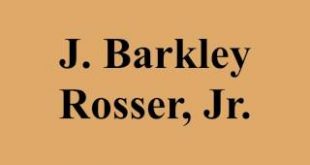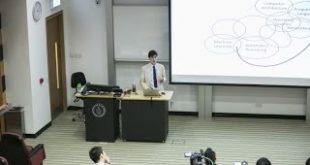Definitely.Front page story in today's Washington Post by Damien Paletta reports that "Treasury chief hurtles toward fiasco," the fiasco being a failure to raise the US debt ceiling in time to avoid a default. Trump has declared that Sec Mnuchin is responsible for this matter, which he should be, but somehow has not made a sufficiently definitive statement to keep his former Freedom Caucus big cheese OMB director, Mulvaney, from opining that Mnuchin is an out of it New York finance guy...
Read More »“Those Of You Who Are Old Enough Will Really Get This”
I am adding yet more to my most recent two posts where I am complaining about this essentially side remark that Larry Summers made in his commemoration of his late uncle, Kenneth Arrow, in which he reports that at the party celebrating Arrow's Nobel Prize in 1972, Summers's other uncle, the late Paul Samuelson was supposedly "discussing how stupid Joan Robinson was." As it is, I should have added to my quote from his talk in the last post what immediately followed that snide and...
Read More »More On Larry Summers Distorting Intellectual History
I would have included what follows in the previous post, but was afraid of putting too much into one post. So, a bit more.Here is the precise quote from Summers's talk about the conversation between Ken Arrow and Paul Samuelson on the evening of the celebration in 1972 in Cambridge, MA."Almost everybody left and Paul and Kenneth were discussing turnpike theorems. Kenneth was discussing aspects of Pontryagin's maximum principle. Paul was discussing how stupid Joan Robinson was."So somehow...
Read More »Larry Summers Reports That In 1972 Paul Samuelson Complained About “How Stupid Joan Robinson Was.”
Ohmigod, he really did this. At the Institute for Advanced Study in Tel Aviv, during a major conference honoring his profoundly wise and honorable uncle, the late Kenneth Arrow, Larry did this. The vast majority of his talk is an outstanding discussion of Ken Arrow as an economist and a person, full of interesting details, all leading to the conclusion that his uncle was both one of the most brilliant economists who ever lived as well as a deeply wise, personable, morally incorruptible, and...
Read More »Comparing Companies to Nations
Asher Schechter raises a good point in How Market Power Leads to Corporate Political Influence but this comparison is troublesome: In 2016, the advocacy group Global Justice Now published a report showing that 69 of the world’s largest 100 economic entities are now corporations, not governments. With annual revenues of $485.9 billion, Walmart topped all but nine countries. GDP is a value-added concept – revenue is not. So what is the right metric? Walmart may have had this much revenue...
Read More »Was Thomas Jefferson A Monstrous Rapist?
It is quite likely that I shall be on the receiving end of some strong opprobrium for this post, but, well, here it goes anyway.So, Shaun King in the New York Daily News in an article being spread around the internet has accused Thomas Jefferson of being a "rapist" (in the article headline) and "monstrous" in the body of the article for his relationship with his slave, Sally Hemings, who bore him six children, with her and them not ever being freed by the in-debt Jefferson. Much of the...
Read More »Here is a Little Economics Lesson
Here’s a little economics lesson: supply and demand. You put the supply out there, and demand will follow. -- Rick Perry, U.S. Secretary of Energy While the media is having fun at the expense of Secretary Perry's asinine "economics lesson" it is worth pointing out that the very same publications that ridicule Perry perpetually peddle the exact same theory under the guise of "debunking" the imaginary lump-of-labor fallacy. Here is The Economist from yesterday telling its readers that the...
Read More »Did Kevin Hassett Ever Hear About the Solow Growth Model?
Why did Brad DeLong dig up some 2007 nonsense by Kevin DOW 36000 Hassett? When Kenneth Arrow was awarded the Nobel Prize in Economics in 1972, one of the contributions the awards committee cited was his miraculous “impossibility” theorem. Decades from now, Arrow’s theorem, originally drawn in his doctoral dissertation, will be viewed as the 20th-century idea that best anticipated the 21st century. While mathematical in origin, the impossibil¬ity theorem is simple to describe in words: A...
Read More »J. Barkley Rosser, Jr.
Video Software we use: https://amzn.to/2KpdCQF Ad-free videos. You can support us by purchasing something through our Amazon-Url, thanks :) John Barkley Rosser, Jr.is a mathematical economist and Professor of Economics at James Madison University in Harrisonburg, Virginia since 1988.He is known for work in nonlinear economic dynamics, including applications in economics of catastrophe theory, chaos theory, and complexity theory .With Marina V. This channel is dedicated to make Wikipedia,...
Read More »IAS Distinguished Lecture: Prof Thomas Reps (5 Jan 2016)
Title : Automating Abstract Interpretation Date: 5 Jan 2016 Speaker: Prof Thomas Reps, J. Barkley Rosser Professor & Rajiv and Ritu Batra Chair of Computer Sciences, University of Wisconsin-Madison Please go to our webpage for more IAS Events: http://ias.ust.hk/
Read More » EconoSpeak
EconoSpeak


